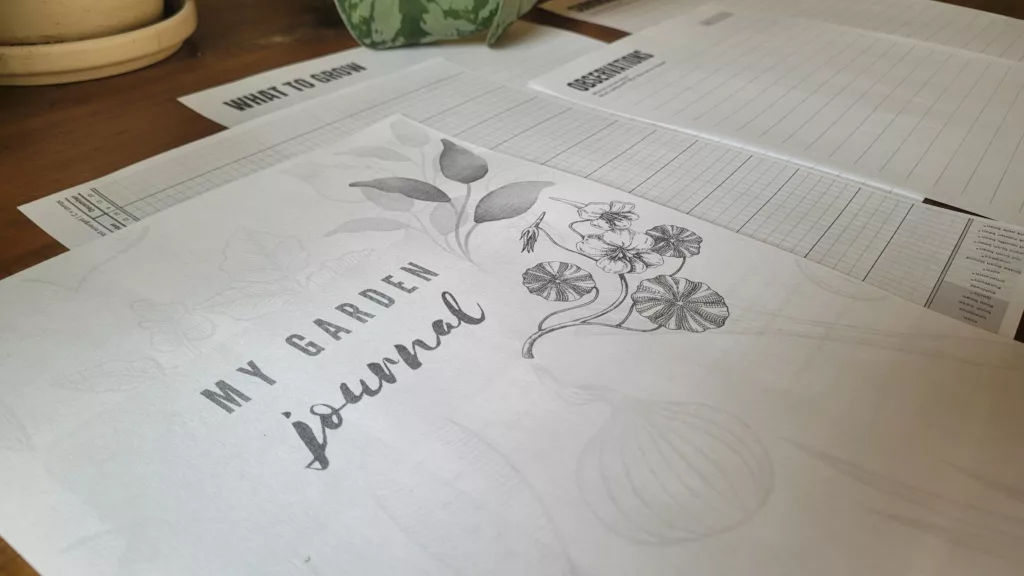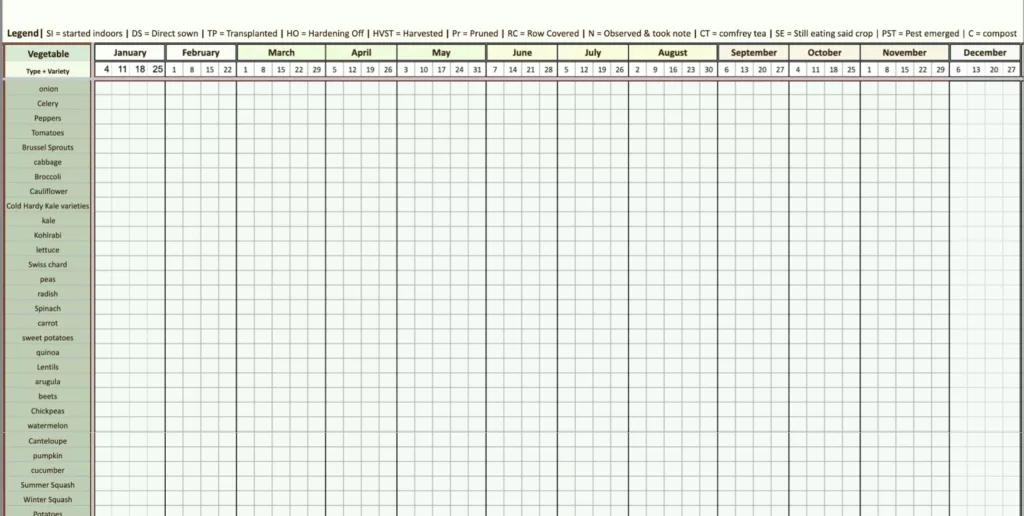This post may contain affiliate links. If you use these links to buy something we may earn a commission. Thanks.
Track your garden experience using a simple digital garden journal in 2024.
See the details: 3 Essentials to Keep a Garden Journal You’ll Use
I track everything on one main digital page because it’s easy to see a whole year of gardening, convenient to journal, and is overall more helpful than flipping pages.
If you prefer the option for both a hard copy and a digital garden journal, it’s also printable on regular paper. You can have the same journal, either way!
You’ll get a digital download with the option to use the garden journal digitally or print a hard copy for writing on.
Whichever you find easiest—paper, computer, or tablet—you’ll easily see your experience and get better at gardening.

With this (printable) digital journal, comes the Best Vegetable Garden Spreadsheet to Follow (Google Sheets Planner): An accurate week-by-week prompt for what to do in your garden and climate.
Not sure when to plant what indoors or outdoors? You won’t have to scramble with overthinking when it’s laid out in front of you week-by-week!
I did the homework, now I’m offering you a complete essay.
No more counting how many weeks until frost to see what to plant. You’ll just see what to plant on the week you’re on and how far away your dates are too.
Paper Vs Digital Garden Journal
Maybe you’ve struggled with keeping a garden journal and so you think a digital version will be the savior.
Regardless of your reason, I think the format makes all the difference in keeping up with a helpful journal (whether it’s paper or digital).
What you track is different from the next person, so a format that can track whatever it is you want to know about your garden is like the universal solution to finding a template that isn’t just a bunch of pages you won’t use.
The journal I made can be printed on regular paper or used digitally.
No matter what you track, you’ll see it on a timeline without the need to flip through pages.
Having both options available, maybe you’re still wondering about the main difference between paper and digital garden journaling. It comes down to one thing, really.
Access to the garden journal is the main difference between paper and digital. Paper is easy to find, open, and write on, but also easy to ruin or lose. Digital is also easy to find, is as easy to open as being someone who doesn’t close tabs, and is easy to type on.
Some digital journals need you to log in every time, but for others, like mine, you’re already logged into your Google account, so if you keep the tab open, you’ll always have it right there as if it’s paper on a desk.
Otherwise, simply navigate to your Google Drive and open up your personal copy and have it on– or offline —it’s all up to you.
Your level of commitment to journaling is likely to change based on easy access! So if you’re doing paper, have a pen lying around. If you’re doing digital, keep a tab open once in a while.
How to keep a digital garden journal
Keeping it simple is the best way to keep any garden journal, especially a digital one.
Digital products are quick to hype up all the bells and whistles as if they are more useful than not having them.
But the truth is, they are only as useful as much as you’ll use them.
So I invite you to commit to one single page (and a few more if you’re up for it).
- Step 1: Decide what about your garden you want to track and why. What do you expect to learn or improve on from tracking these things?
- Step 2: Keep it simple and commit to a layout where you can see everything
- Step 3: Set a weekly alarm to ensure you add to your journal once a week at minimum (more is great)
- Step 4: Look back at what you’ve recorded and adjust your actions in the garden next time
Set a weekly alarm on a day and time you’re available, perhaps during your Sunday morning coffee you can pop down a few characters that indicate what you’ve done over the week and write out a few notes if you have any in mind.
By the end of the year, you’ll be staring at more garden insights than any other journal you’ve tried.
If for whatever reason you don’t stick with it, you’ll at least have a free custom-climate schedule to follow for expanding your garden and planting everything you want without the brain scramble of when to do what.
Recent Posts
There’s no shortage of full-sun ground covers for zone 4 climates! Each plant in this list can withstand the frigid temperatures and also enjoy the hot sun in summer. Full sun means that a plant...
There's no shortage of full sun ground covers, not even in zone 3! Zone 3 climates offer hot but short-lived summers and very cold winters. So each plant in this list can withstand the frigid...


